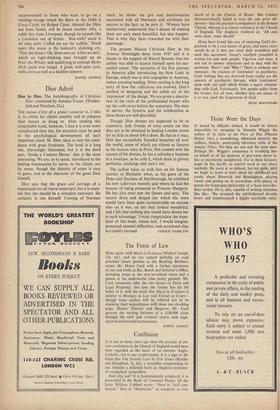Confession
I r is not so many years ago since the practice of pri- vate confession in the. Church of Englund would have been regarded as the mark of an extreme Anglo- Catholic, not to say crypto-papist. It is a sign of the times that The Double Cure by Eric James (Hodder and Stoughton, 2s. 6d.), a pamphlet commending its use, includes a welcome from an Anglican professor of evangelical sympathies.
And why not? It is fundamentally scriptural; it is prescribed in the Book of Common Prayer. Of the latter William Cobbett wrote: 'Here is "oral con- fession," here is "absolution," as complete as ever heard of in the Church of Rome.' But Cobbett characteristically failed to note the one great dif- ference—that the practice is compulsory in the Roman Church, whereas it is always voluntary in the Church of England. The Anglican tradition is: 'All can, none must, some should.'
Many have found this way of receiving God's for- giveness to be a real means of grace, and many more would do so if they put away their prejudices and used this sacrament. James's excellent pamphlet is written for just such people. Vigorous and clear, it sets out to answer objections and to deal with the questions 'How?' and 'Why?' There is perhaps one omission : the relation of 'confession' to psychiatry. Guilt feelings that are divorced from reality are the concern of psychiatric therapy, while 'confession' deals with real guilt which blocks a man's relation- ship with God. Fortunately, few people suffer from the former, but all men, whether they are aware of it or not, need the forgiveness of God.
HUGH MONTEFIORE


































 Previous page
Previous page